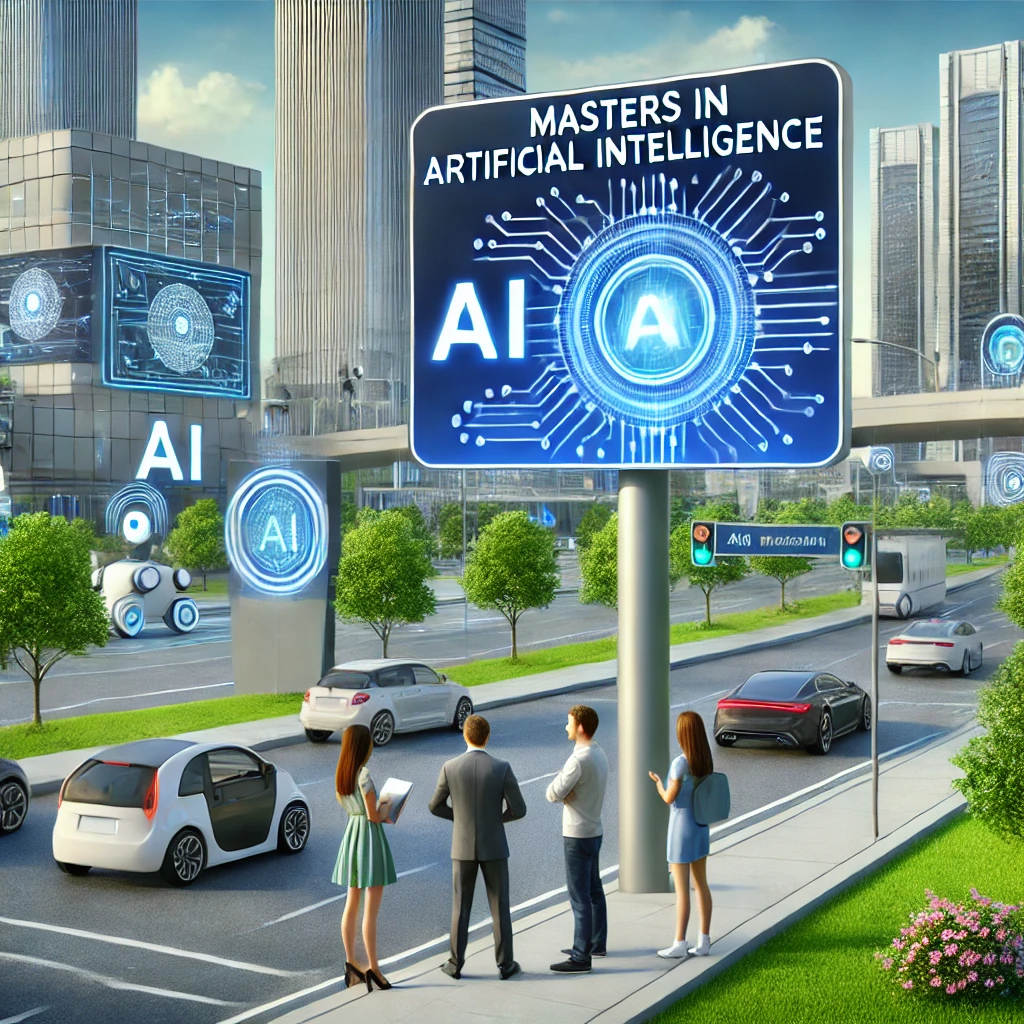Artificial Intelligence stands today as a dominant force in technology that molds various industries such as healthcare together with finance. AI-powered solution adoption has created a constant need for specialized professionals in AI domains at all-time high levels. A Masters in Artificial Intelligence trains students to master machine learning alongside deep learning, natural language processing, robotics and similar complex topics for which they will prepare to work in this developing field.
The implementation of AI surpasses traditional tech companies because current industries including healthcare and cybersecurity along with e-commerce and entertainment depend on AI automation to make efficient operational and strategic choices. Studying for a master’s degree in AI will give you both fundamental theoretical understanding and practical experience to make you capable of developing all-embracing smart systems. AI specialists play an increasingly vital role in modern business operations while master’s programs in AI provide students with essential knowledge and skills thus ensuring a solid financial return on their education.
What Does a Masters in Artificial Intelligence Cover?
Masters in Artificial Intelligence courses create a learning platform that)arguably gives students complete knowledge regarding AI principles alongside hands-on practice in applied AI implementations. The study program consists of machine learning alongside deep learning together with computer vision and reinforcement learning and AI ethics along with big data analysis subjects. The curriculum introduces different programs and libraries which AI developers commonly use through lessons on Python TensorFlow and PyTorch.
The program emphasizes its main emphasis on practical AI implementations. The study focuses on practical tasks which require students to create AI models together with algorithm development and machine learning system deployment. The curriculum integrates AI ethical considerations together with policy development to prepare graduates about the social and moral aspects of AI that have become essential in recent times as AI evolves. A few programs combine artificial intelligence instruction with robotics and neuroscience and business analytics curriculum to expand the availability of job opportunities for their students.
Career Opportunities After Completing a Masters in Artificial Intelligence
Students who earn their Masters in Artificial Intelligence discover multiple profession options within different business fields. Skilled professionals who design and develop intelligent systems receive high value because these systems boost business functionality alongside user experiences. Cambridge graduates pursuing AI roles can fulfill duties as machine learning engineer and data scientist and AI research scientist and robotics engineer and AI consultant.
The technology sector currently provides highly rewarding AI career options because major companies including Google, Microsoft and Facebook together with Amazon continuously recruit specialists to enhance their products. Healthcare organizations and biotech firms NOW ACCEPT AI specialists to further their medical diagnostic capabilities and their discovery of new drugs and their custom treatment solutions. Financing companies see value in implementing AI technology for fraud protection services and algorithm-driven trades and risk control systems thus creating opportunities for AI experts in banking and investment sectors.
AI technology extends its influence toward gaming applications and its implementation in smart cities and autonomous vehicles as well as customer service automation systems. Professionals who excel in both natural language processing and conversational AI development see a growing market demand because of increasing adoption of AI-driven chatbots and virtual assistants. Masters-level AI professionals will face sustained employment opportunities because of the wide range of applications this field supports.
The Role of Research in a Masters in Artificial Intelligence
Following completion of a Masters in Artificial Intelligence program students obtain valuable experience in research activities through various university projects. Students receive support from universities and institutions to join AI research projects which advance the limits of current machine learning and neural networks capabilities. AI research explores four primary fields namely computer vision combined with natural language processing together with reinforcement learning plus AI ethics scholarly investigation.
The majority of students decide to distribute their work through prestigious journals alongside presenting their discoveries at conferences like NeurIPS, CVPR and ICML. By conducting research students gain access to novel AI advancements through which they can advance advancements that will shape future possibilities. Certain AI master’s programs supply research assistant opportunities which allow students to work directly with professors and industry experts on leading AI investigations.
Online vs. On-Campus Masters in Artificial Intelligence Programs
The increase in AI learning needs has triggered educational institutions to launch stand-alone AI master programs accessible through both on-campus and internet education systems. Organization of future studies between various options depends upon individual learning preferences and career ambitions together with lifestyle choices.
Students who attend Masters in Artificial Intelligence programs on campus gain practical skills through lab work and faculty interaction as well as networking benefits with both students and industry experts. On-campus training with a structured environment and shared interaction suits students who like working in traditional educational settings.
The advantage of an online AI master’s program is the flexibility which accommodates both career professionals as well as students who wish to learn at their own pace. Some of the best recognized universities present their complete on-campus AI programs through high-standard distance learning facilities. Students benefit from online education because it permits them to finish their assignments and study through virtual classes alongside working with classmates who live across the globe so it provides academic convenience.
The Future of Artificial Intelligence and Its Impact on Society
Artificial Intelligence progresses in a positive direction because ongoing developments create new changes which affect both industrial and governmental sectors and people’s everyday activities. The future of automation depends on AI because it will cut repetitive work which allows faster and more efficient decision processes. The list of attainable achievements extends to driverless vehicles as well as AI-diagnostic healthcare systems. Faster AI development forces society to tackle multiple ethical issues because it raises concerns about eliminating employment, violates individual privacy and produces biased AI systems.
Enrolling in a Master’s degree in Artificial Intelligence provides students with abilities to create AI systems while giving them the tools to deal with responsibility in their work. AI ethics together with regulatory standards form essential components of AI instruction to support professionals in developing impartial and clear AI systems. AI specialists will assume critical responsibility to ensure ethical practices of AI when governments and organizations launch AI-administered policies.
FAQs
Students interested in Masters in Artificial Intelligence must consider the length of study duration.
The completion time of Masters in Artificial Intelligence programs depends on both university policies and the country of attendance. The duration for full-time artificial intelligence programs extends from one to two years but part-time learning or online study frequently expands the completion time. Students can finish their AI master’s studies at selected universities through their accelerated programs that let students graduate early.
The investment of time and effort towards acquiring a Masters in Artificial Intelligence brings what value to students?
Students who want to achieve career progression in AI and data science fields find profound value in earning their Masters in Artificial Intelligence. Professionals working with AI remain greatly sought after in the market which leads to excellent compensation within the technology sector. AI master’s graduates receive specific abilities through their studies which help them succeed in competitive job markets.
A candidate needs which qualifications to join Masters in Artificial Intelligence?
Universities expect admission candidates to demonstrate education in computer science together with qualifications in engineering or mathematics or any related technology discipline. Students need to understand Python programming besides holding experience in machine learning principles before they enroll. The curriculum contains introductory training elements that help non-technical students overcome their academic deficiencies.
Job opportunities appear what graduates might pursue following completion of their Masters in Artificial Intelligence.
AI graduates possess the ability to take roles such as machine learning engineer, data scientist, AI consultant, AI researcher and robotics engineer. AI professionals provide their services to organizations in healthcare together with finance and automotive and e-commerce sectors. AI expertise remains in high demand which secures attractive job opportunities for graduates trained in AI.
What amount of money will it take to receive a Masters in Artificial Intelligence?
Artificial Intelligence master’s programs have tuition fees composed of three key elements which are university attendance, geographical region and study format between online and on-site. Students must expect to pay between $10,000 to $50,000 yearly for their education. Students can utilize university programs that provide financial aid through scholarships together with assistantship opportunities to handle education costs.
Conclusion
A degree in Artificial Intelligence Master level provides multiple career possibilities across the revolutionary technologies of modern technology. The evolution of AI requires experts who understand it to become the main drivers of industrial transformation because they will lead industry operations into new directions. Students who select programs between traditional classroom studies and distance learning formats gain needed AI expertise which boosts their professional success in the active and competitive field. To achieve success as an artificial intelligence professional you must first grasp ethical matters and monitor AI developments in addition to obtaining practical expertise.


